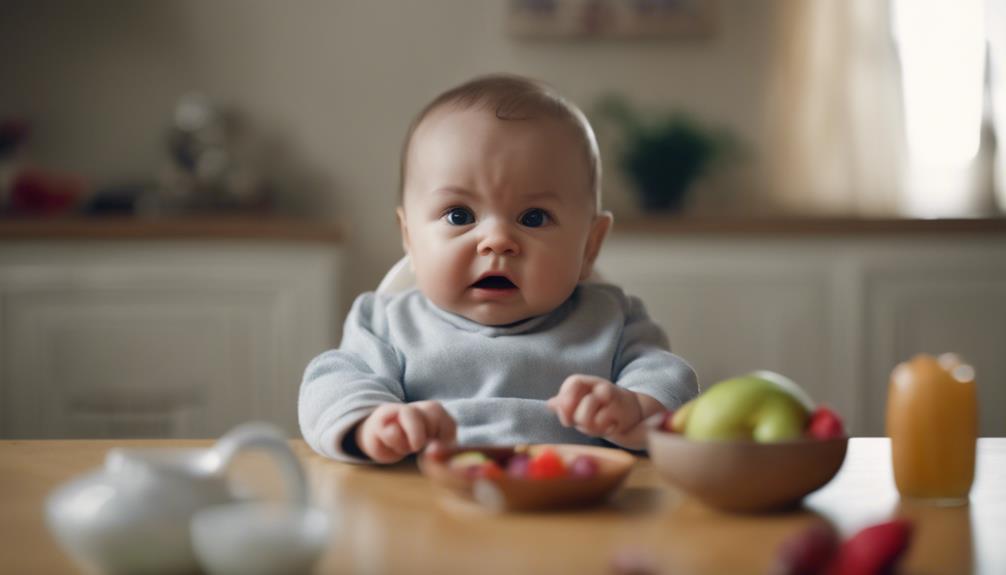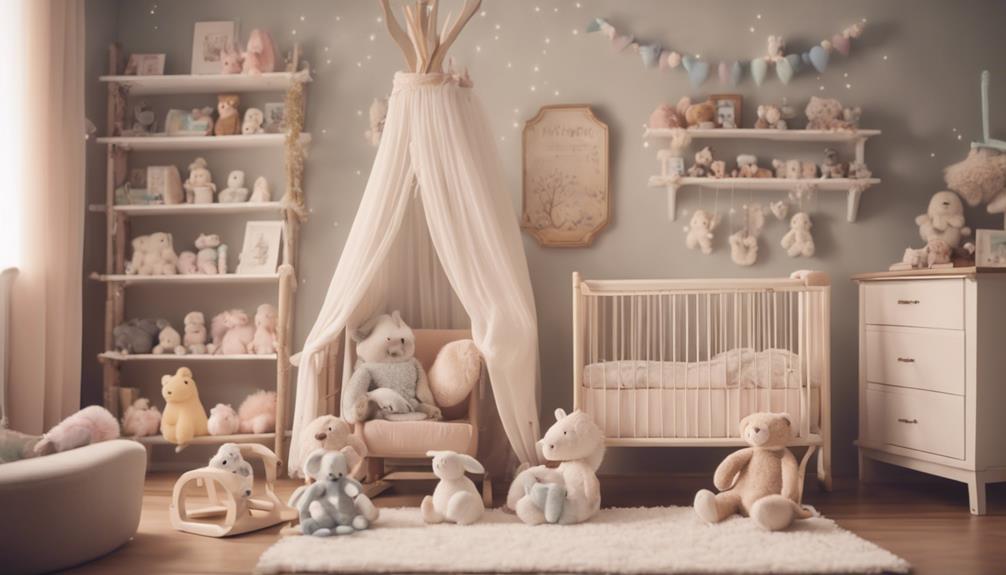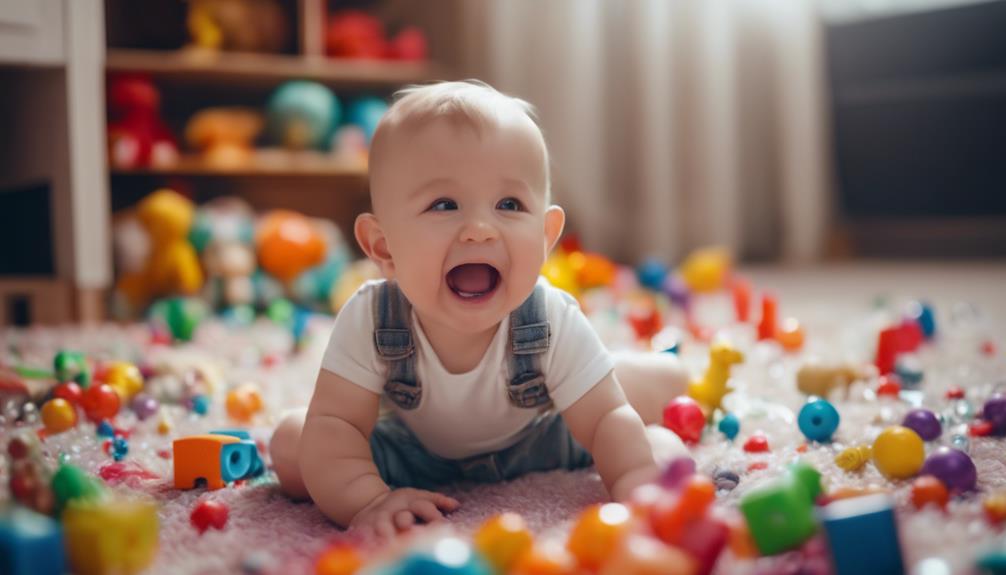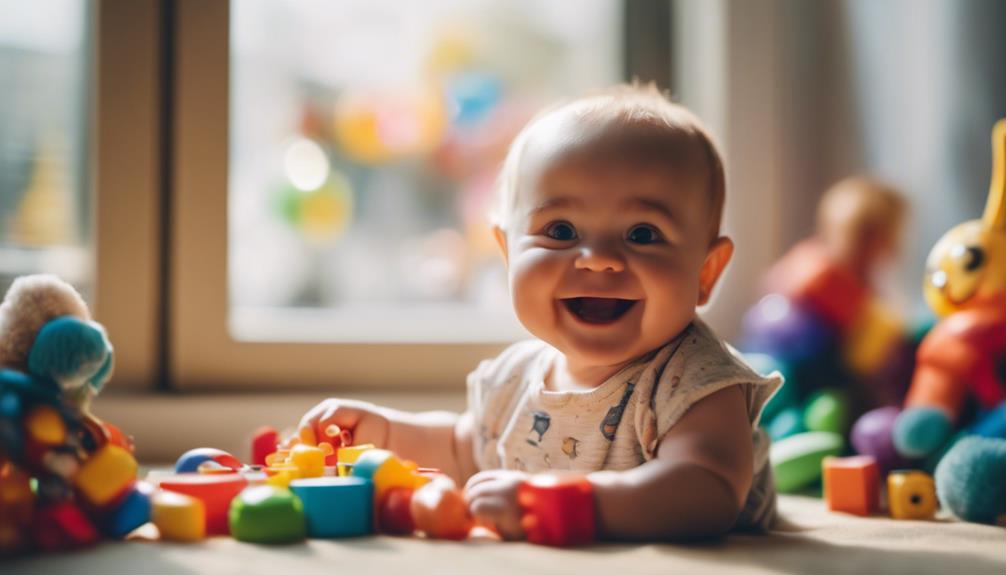If your baby cries more, struggles with sleep, avoids eye contact, drools excessively, or shows tension, they might be stressed. Look for appetite changes, irritability, or high body temperature as signs. Soothe them with swaddling, gentle rocking, and white noise. Massages, pacifiers, and skin-to-skin contact can relieve stress. Use soft music and warm baths for relaxation too. Providing a calm environment can help your baby. These techniques promote bonding and emotional well-being. More ways to soothe your stressed baby await you.
Key Takeaways
- Excessive crying, sleep changes, and irritability indicate stress in babies.
- Soothing techniques like gentle rocking, white noise, and swaddling help calm stressed babies.
- Skin-to-skin contact, warm baths, and massage promote relaxation and bonding.
- Consistent routines, soft lighting, and peaceful environments reduce stress levels in babies.
- Address feeding difficulties promptly and provide security through pacifiers and skin-to-skin contact.
Recognizing Signs of Stress
Recognizing signs of stress in babies is essential for understanding their needs and providing appropriate care. Stress in babies can present itself through various signs such as increased crying, changes in sleep patterns, and difficulty making eye contact.
You may also notice fussiness, irritability, excessive drooling, or clenched fists, indicating that the baby is feeling overwhelmed. Watch out for signs like arching their back, becoming rigid, avoiding eye contact, or displaying a strained expression, as these could be cues of stress.
A stressed baby may struggle to settle down, show excessive clinginess, or seem uncomfortable during feeding or diaper changes. By recognizing these signs early, you can provide comfort, soothing, and create a calm environment for the baby to help them feel secure and supported.
Understanding these indicators will enable you to respond promptly and effectively to your baby's needs, promoting their overall well-being and emotional development.
Excessive Crying and Sleep Issues

If your baby is crying excessively or having trouble sleeping, it could be a sign of stress. Analyzing their crying patterns and optimizing their sleep environment can help address these issues.
Demonstrating comforting techniques like gentle rocking or a calming bedtime routine can assist in soothing your stressed baby.
Cry Patterns Analysis
Wondering how excessive crying and sleep issues can signal stress in your baby? Understanding cry patterns is key to identifying stress in babies.
Excessive crying, lasting around 2-3 hours a day, may indicate your baby is feeling overwhelmed.
Sleep issues, like difficulty falling asleep or frequent waking, can also be signs of a stressed baby in need of soothing. If your baby struggles to settle down for naps or bedtime, stress might be the underlying cause.
By recognizing these patterns, you can implement soothing techniques to help calm your baby. Consistent methods such as gentle rocking or white noise can aid in soothing your little one and improving their sleep routine.
Sleep Environment Optimization
How can you optimize the sleep environment to alleviate excessive crying and sleep issues in your baby?
Creating an ideal sleep environment is essential for improving baby sleep and reducing stress. To achieve this, consider implementing the following:
- Consistent Bedtime Routine: Establishing a regular bedtime routine helps signal to your baby that it's time to sleep, promoting better sleep patterns.
- Comfortable Sleep Space: Make sure your baby's sleep space is cozy, safe, and free from distractions to encourage restful sleep.
- White Noise: Using white noise, such as a fan or a sound machine, can help drown out background noises and create a soothing environment for your baby to sleep peacefully.
Comforting Techniques Demonstration
To effectively address excessive crying and sleep issues in your stressed baby, demonstrating gentle comforting techniques is essential. Excessive crying can be a distressing sign of stress in babies, often triggered by various factors like overstimulation or discomfort. By employing soothing techniques such as gentle rocking, swaddling, and white noise, you can help alleviate your baby's distress and promote relaxation.
Additionally, sleep issues, such as frequent waking or difficulty falling asleep, can also indicate stress in babies. Establishing a calming bedtime environment with dim lighting, soft music, and gentle movements can aid in soothing your baby and improving their sleep quality.
Consistent comforting practices, including skin-to-skin contact, cuddling, and gentle massage, can play a significant role in alleviating stress and promoting relaxation in babies experiencing excessive crying and sleep disturbances. By incorporating these comforting techniques into your routine, you can create a more peaceful and soothing environment for your stressed baby.
Changes in Appetite and Irritability

If you notice your baby eating less or more than usual, it could be a sign of stress.
Irritability, like increased crying and fussiness, may also indicate your baby is feeling overwhelmed.
Understanding these changes in appetite and behavior can help you provide the necessary soothing techniques to comfort your little one.
Eating Habits Disrupted
Changes in appetite and irritability can be clear indicators of stress in a baby. When a baby's eating habits are disrupted, it may signal underlying stress that needs attention.
Here are some ways disrupted eating habits can manifest in a stressed baby:
- Changes in Eating Patterns: A stressed baby may eat more or less than usual, showcasing a shift in their typical feeding routine.
- Irritability During Meals: If a baby becomes fussy, cries, or shows signs of agitation while feeding, it could be a sign of stress affecting their mealtime.
- Refusal to Eat: Babies experiencing stress may refuse to eat altogether or exhibit reluctance to feed, which might be a cry for help in managing their emotions.
Understanding these signs and addressing feeding difficulties promptly is essential to soothing a stressed baby and ensuring their well-being.
Soothing Techniques for Irritability
When a baby shows signs of irritability due to changes in appetite, employing soothing techniques can help alleviate their stress and discomfort effectively.
Infant stress, often displayed through increased fussiness and difficulty soothing, can be addressed using gentle touch, creating a calming environment, and practicing responsive parenting.
To soothe an irritable baby, consider gentle rocking, swaddling, or offering a pacifier for comfort.
Maintaining a quiet and soothing atmosphere, reducing external stimuli, and establishing consistent routines can also help ease irritability in a stressed infant.
It's important to pay attention to your baby's cues, respond promptly to their needs, and offer comfort through soft voices and gentle touches.
Soothing Techniques for Babies

Soothing techniques for babies include swaddling, gentle rocking, and white noise to recreate a calming environment similar to the womb. When your baby is stressed, these techniques can help soothe them and promote a sense of calm.
Massaging: Using gentle, slow strokes can reduce stress and promote relaxation in your baby.
Pacifier and Skin-to-Skin Contact: Offering a pacifier or skin-to-skin contact can provide security and alleviate stress in babies.
Rhythmic Movements: Engage in slow, rhythmic movements like swaying or gentle bouncing to help regulate your baby's nervous system and promote relaxation.
Gentle Rocking and Soothing Music

Using gentle rocking and soothing music can create a calming environment for a stressed baby, promoting relaxation and emotional well-being. Gentle rocking mimics the comforting motion babies experienced in the womb, helping regulate their heartbeat and breathing.
This rhythmic movement can soothe a stressed baby, promoting a sense of security and calm. Additionally, soothing music can have a calming effect on babies, reducing stress levels and aiding in emotional regulation.
Soft melodies or white noise can create a nurturing environment that promotes relaxation and better sleep for your little one. Combining gentle rocking with soothing music can enhance the calming benefits, creating a peaceful atmosphere for your stressed baby to unwind and feel safe.
Skin-to-Skin Contact and Warm Bath

For a stressed baby, engaging in skin-to-skin contact and giving them a warm bath can provide soothing relief and promote relaxation. Skin-to-skin contact helps regulate the baby's body temperature, heart rate, and stress levels, while also triggering the release of oxytocin, a hormone that promotes feelings of comfort and bonding.
Warm baths, on the other hand, can soothe a stressed baby by mimicking the cozy environment of the womb, reducing muscle tension, and creating a sense of security and calmness.
Both skin-to-skin contact and warm baths offer valuable bonding opportunities that enhance the parent-baby relationship. Incorporating these practices into your routine can not only help calm a stressed baby but also strengthen the emotional connection between you and your little one.
Creating a Calm Environment

To create a calm environment for your stressed baby, focus on reducing stimulation and providing soothing surroundings. Soft lighting, gentle sounds, and comfortable temperatures play an important role in promoting relaxation for babies.
Establishing a consistent routine and familiar setting can help decrease stress levels. Avoid loud noises, abrupt movements, and overwhelming activities to maintain a peaceful atmosphere.
By creating a secure and tranquil space, you support your baby's emotional well-being and stress regulation. Remember that a calm environment not only benefits your baby but also fosters a secure attachment between you and your little one.
Prioritize creating a soothing atmosphere that encourages relaxation and comfort. Your efforts in establishing a peaceful setting will contribute significantly to your baby's overall well-being and happiness.
Frequently Asked Questions
How to Relieve Stress in Babies?
To relieve stress in babies, you can try soothing techniques like gentle rocking, baby massage, and white noise. Creating a quiet and comforting environment, swaddling the baby, and maintaining routine can also help alleviate stress.
How to Deal With Stress of Having a Baby?
You can deal with the stress of having a baby by prioritizing self-care, seeking support from loved ones, communicating openly with your partner, and practicing mindfulness techniques. Remember, taking care of yourself is essential for your baby's well-being too.
How to Calm an Anxious Baby?
When your baby feels anxious, remember to create a peaceful oasis. Embrace gentle rocking, soothing music, and swaddling. Stick to routines and offer calming touch. Avoid chaos; opt for tranquility to soothe your little one.
What Are Three 3 Signs of Stress Distress or Pain in Babies?
When your baby is stressed, distressed, or in pain, watch for increased crying, changes in sleep patterns, and feeding difficulties. These signs may indicate discomfort or distress in infants, prompting you to seek support and soothing strategies.
Conclusion
To sum up, recognizing the signs of stress in your baby and knowing how to soothe them is essential for their well-being. By being attentive to their cues and using gentle soothing techniques like rocking, skin-to-skin contact, and creating a calm environment, you can help your little one feel safe and secure.
Remember, a happy baby is a healthy baby, and a peaceful baby means a peaceful home. Soothe your baby, soothe your world.










